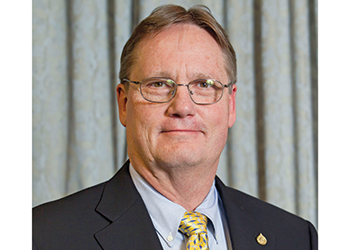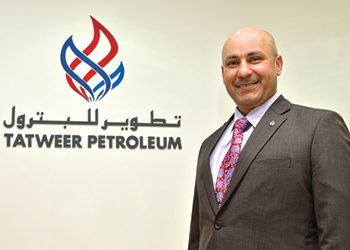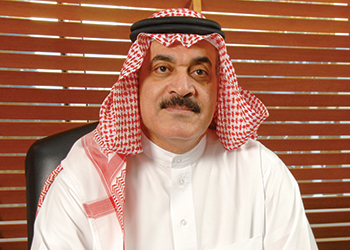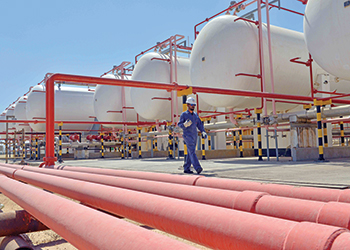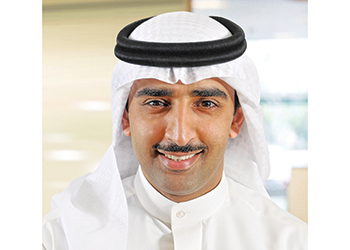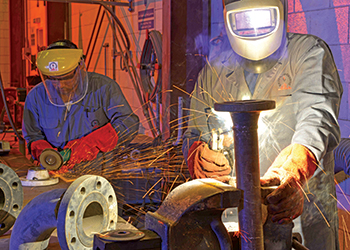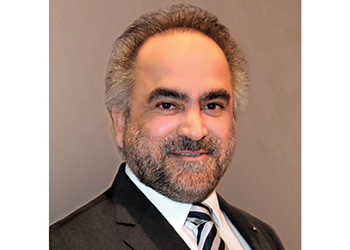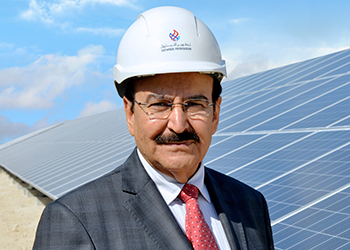
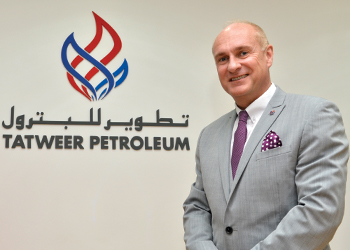 Kershaw ... Tatweer remains confident
Kershaw ... Tatweer remains confident
During 2015, the firm also undertook 1,904 commercial commitments totalling $455 million. The major awards included the new 500 mmscfd NAG central gas dehydration unit construction, says ANDREW KERSHAW, CEO Tatweer Petroleum
Tatweer Petroleum, a joint venture of three strategic partners – nogaholding, US-based Occidental Petroleum and Abu-Dhabi-based Mubadala Petroleum – had it strongest year ever in 2015, pushing crude and condensate production to record highs of over 55,000 barrels per day (bpd) and levels not seen in over 40 years, says Andrew Kershaw, CEO Tatweer Petroleum.
"Our safety record was tremendous and it was our best performance in six years. As well as that, we worked hard on costs and ended the year with substantial savings and improvements in efficiencies of around 20 per cent," Kershaw tells OGN in an exclusive interview.
Despite lower oil prices, Tatweer worked hard to mature its enhanced oil recovery pilots both in steam and high volume lift to further understand their potential so that when oil prices are more favourable it will be clearer where and how to invest to expand these sorts of projects, he says.
Overall Tatweer remains confident that once these tough times have passed that as a result of the proactive pilot programme work as well as the cost reduction measures it was taking Tatweer will emerge as a more efficient and stronger company and ready to rapidly expand, he says.
During 2015, Tatweer also undertook 1,904 commercial commitments totalling $455 million. The major awards included the new 500 mmscfd NAG (non-associated gas) central gas dehydration unit construction and the extension to the associated gas compression services, he says.
Excerpts from the interview:
What is the significance of the contract with Petrofac to install a new 500 million standard cubic feet per day gas dehydration facility?
Tatweer Petroleum’s on-going development of the Bahrain oil field took a significant step forward with the signing of a new contract on September 1, 2015 to install a new 500 mmscfd gas dehydration facility. As the initial phase in a series of planned gas capacity projects scheduled for the next three to five years, it marks the start of Tatweer Petroleum’s commitment to secure the delivery of natural gas needed to meet the growing demands of the kingdom. Installation of the new gas processing facility will be a significant milestone and signing this contract is the next big step forward for Tatweer Petroleum in the implementation of its long term development plan for the Bahrain oil field. We are all very excited and proud to be able to move this ahead.
What does the newly proposed 2016 budget and five-year plan envisage for the company?
Tatweer Petroleum plans to continue its focus on optimizing the ongoing improved oil recovery schemes such as steam injection and artificial lifting techniques which have shown good potential to extract more difficult oil from the Bahrain field. We see our company as a leader in the development of mature fields in the area.
After over six years of operation how much have you been able to improve production at the Bahrain Field?
The Bahrain Field is currently producing an annual average of 50,600 bpd of total oil and condensate and approximately 60 per cent more than when the JV company, Tatweer took over operations in 2009. I think that although conventional wisdom had written off the field Tatweer has successfully rejuvenated it and modernised it to a world class operation and a 21st century high tech digital oil field extending its life by possibly another 80 years.
 |
Tatweer’s newly installed solar plant |
Have you achieved your output targets? If not, why? If yes, what were the factors that contributed towards the achievement?
Tatweer broke new production records last year and far exceeded its output target for 2015.
Our shallow drilling programme has shown some truly outstanding results with some of our new wells producing over 1,000 bpd where previously these had been only 60 bpd. Using advanced drilling technology as well as improved drilling efficiencies we have been able to reduce costs and target sweet spots in the reservoirs that were previously not thought technically or economically possible.
The rubble reservoir heavy oil project that uses steam injection for enhanced oil recovery has been an overwhelming technical success and has averaged around 500 bpd of heavy oil this year. This is a remarkable achievement for this type of highly fractured and extremely tight carbonate rock reservoir.
As well as that, we have made oil field history and produced the first-ever extra-heavy oil in Bahrain from the Aruma reservoir utilising steam injection for enhanced oil recovery.
On the subject of enhanced oil recovery, we have also been piloting a highly complex oil project to recover light oil by using steam to actually vaporise oil from the reservoir and then turn it back into liquid oil when it reaches the surface. While we are in the early stages of work here, as the distillation process takes a considerably long time, we have technically mobilized the oil and successfully produced it using this very novel process.
Tatweer has also been hard at work in installing new electrical submersible pumps in a number of its water wet wells in order to literally drag additional oil from the reservoir.
Our subsurface studies team has also identified many more prospective opportunities in reservoirs beneath the Bahrain field that have previously not been developed or produced.
Of course, all of the above take a lot of time and need huge technical expert resources as well as a considerable amount of investment. But it is all very exciting and extremely encouraging.
 |
Tatweer has been aggressively drilling since it commenced |
What was the total annual committed spent in 2015? How many new contracts were awarded? Kindly give the details.
During 2015, Tatweer processed 1,904 commercial commitments totalling $455 million. Major awards in 2015 included:
• New 500 mmscfd NAG central gas dehydration unit construction;
• Extension to associated gas compression services;
• Significant and major drilling services contracts retendered;
• Procurement of electrical submersible pumps; and
• Downhole and corrosion treating services.
Do you plan fresh capital injection to fast-track the field development?
As I mentioned, Tatweer is continuing to invest in its pilot appraisals for thermal enhanced oil recovery in readiness for when oil prices recover. Our spending this year will be highly optimised in order to focus on the best opportunities to maximize the economic production of oil. Since the start of the oil price down turn at the end of Q3 2014, we have successfully managed our programmes to slash our costs of production and we are now among the lowest of the regional producers and therefore to an extent that eases some of the pressure we face under this low price environment. Choosing the best development wells as well as dramatically scrutinising and improving the margin on each dollar we invest is essential.
What are the targets set by Tatweer for 2016?
We need to keep a steady hand on the tiller and to maintain the current high production levels while better understanding the economic potentials of our EOR pilot appraisals in order to steer through the low oil price period.
How many more wells will be drilled during 2016? What is the total number of wells drilled till end-2015?
Tatweer has been aggressively drilling since it commenced operations six years ago and last year added 62 new wells, bringing the total count of new wells drilled since Tatweer took over operations to 845. This has doubled the well count in the field to around 1,700 wells which is a significant increase in the short time from when Tatweer took over the field in 2009 when there were less than 800 wells drilled over an 80-year period.
What was the black oil production exit rate at the end-2015? What was the average oil production rate in 2015? What was the average availability of non-associated gas for the year?
Tatweer produced 46,200 bpd exceeding last year’s record in black oil production of 44,400 bpd, with total oil and condensate averaging 50,600 bpd. Production capacity of non-associated gas exceeded targets, averaging 2.2 billion cubic feet per day and met the kingdom’s demand.
What are the challenges that you face currently in your task of boosting output? How do you overcome them?
Oil price is the most significant challenge, for obvious reasons. As well as that we have a very complex set of 16 stacked reservoirs from extra-heavy oil near the surface to very light oil deeper down in the structure. Each reservoir has its own unique characteristics and requires different recovery techniques to be applied – they also require an enormous amount of hard engineering work to keep them performing. But having said that, Tatweer has one of the strongest technical teams in the industry and we’re very confident that once oil prices recover our teams will be ready and waiting with our expansion plans.
 |
Tatweer ... employing new technologies to recover more |
What were the new construction projects undertaken during 2015?
We initiated the design and construction for the expansion of the steam and production facilities for our rubble heavy oil appraisal wells located in the west and east of the field. The results of these patterns along with ongoing operations will mature our understanding of thermal development of rubble reservoir.
In addition, and in order to conserve gas and to manage our excess associated gas, we installed an another 105 mmscfd of gas compression facilities that re-injects this excess gas back into our oil reservoirs for pressure support. Tatweer now compresses and handles around 350 mmscfd of associated compared to zero when it took over operations six years ago.
Development of the NAG system also took a significant step forwards when the engineering procurement and construction contract for the central gas dehydration facility was awarded in September. Detailed engineering has started and long lead equipment purchase orders placed. The facilities are due to start up in the first quarter of 2018. Most importantly, all of the above have been completed safely. Our three construction contractors have together worked over 9 million man-hours without a lost time incident.
What new technologies have you employed in 2015 the improve production at the Bahrain Field?
The most notable technology we’ve been piloting is the thermal steam injection process into the gas cap of a light oil reservoir. This technique actually extracts stranded oil held up in the "roof" of one of light oil reservoirs by distilling the oil and vaporizing it. The oil is then produced to the surface in gas/vapour form and then re-condensed at the surface. Using this technique, and once expanded to full field, we estimate that another 60-100 million barrels of oil could be recoverable.
As I also mentioned our electrical submersible down hole pumps are making a significant improvement to production as a part of our high volume lift programme.
What are the green initiatives being undertaken by Tatweer?
Tatweer is committed to the conservation of the kingdom’s natural resources and the protection of the environment. We recently installed a new one megawatt solar power plant. The project was fast tracked and was operational within five months of contract award and was under budget.
The new solar plant is capable of supplying around 10 per cent of Tatweer’s present power consumption. Solar energy panels connect to Tatweer’s own power grid to deliver enough power for the autonomy of its headquarters building. During weekends and times of low use of the HQ, excess power is fed back into the Tatweer power grid for use elsewhere in oil field operations. This reduces and conserves the gas consumption burned for fuel in the power stations as well as reduces emissions.
Tatweer has also installed and now operates eight water treatment and water re-use plants that treat all its produced water to remove oil and solids before re-injecting the same into oil reservoirs for pressure maintenance. Further, Tatweer has modernized and improved air emissions and waste management by deploying world class programmes with world class standards.
As part of its social responsibility, Tatweer also contributes significantly to the clean up after the public camping season and provides funds as well as contractor labour to remove camping waste from the Bahrain Field.
With health, safety and environment as one of its core company values, Tatweer Petroleum strives to provide a safe workplace and is committed to the protection of the environment. Campaigns, initiatives and bulletins are put in place every year to address industry trends and safety risks. Tatweer continues to safeguard the kingdom’s resources minimising the operations impact on the environment while maximizing the value it is returning to the kingdom.



















































































